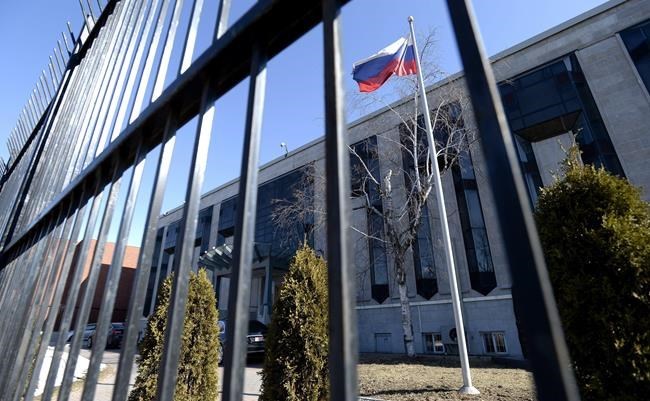OTTAWA — Respondents to a public consultation favoured establishing a foreign influence transparency registry, but stressed a need for clarity on how it would work, the federal government said Friday.
A newly released summary of the consultation says participants wanted a registry to appropriately define who has to sign on and to spell out what falls within the scope of covered activities.
Following a flurry of media stories about alleged foreign interference, Public Safety Canada announced a consultation in March on how Canada could implement a foreign influence transparency registry.
States might engage in interference to advance foreign political goals, and can employ people to act on their behalf without disclosing ties to the foreign state.
Some believe that requiring these individuals to formally register with the government they are trying to influence, with the possibility of fines or even prison time for failing to comply, can make such dealings more transparent.
The consultation summary says respondents supported both financial and criminal penalties, and "adequate enforcement capabilities" to ensure compliance.
They also emphasized that a registry should, to the extent possible, avoid undue administrative burden for registrants, the summary adds.
The United States and Australia have such registries, and a transparency scheme is expected to come into force in the United Kingdom next year.
The summary report is an overview of comments from over 1,000 online respondents and more than 80 key stakeholder groups, as well as public commentary in Canadian media.
While respondents "were overwhelmingly in favour" of establishing a registry, many said it was just one tool of many to counter foreign interference.
The summary says stakeholders urged the government to undertake "structural and cultural reform" and other legislative amendments in the national security realm, continue its outreach program with communities at risk from foreign interference and allocate additional resources toward the enforcement of existing counter-foreign interference legislation.
With an eye toward other measures, the government announced Friday it is beginning new consultations on possible changes to the Canadian Security Intelligence Service Act, which governs Canada's spy service, as well as the Criminal Code, the Security of Information Act and the Canada Evidence Act.
"Engaging with individuals and communities most affected by foreign interference threats is critical to ensure a wide range of views and expertise is captured in developing enhanced measures," the government said in a statement.
It is accepting online submissions until Feb. 2 through a consultation webpage.
"In addition to the online public consultations, the government will also seek the input of experts, stakeholders and community groups through roundtable discussions in the coming weeks and months."
Amid leaks to the media and pressure from opposition parties, the government announced in September that a Quebec judge would lead a public inquiry into allegations of foreign interference and the federal capacity to address the issue.
Quebec Court of Appeal Justice Marie-Josée Hogue will examine meddling by China, Russia and other foreign states and non-state actors.
A discussion paper prepared for the consultation defined a foreign principal as "an entity that is owned or directed, in law or in practice, by a foreign government. This could, among others, include a foreign power, a foreign economic entity, a foreign political organization or an individual or group with links to a foreign government."
The summary says online respondents firmly agreed with the definition and said Canadians have a right to know about the depth of foreign influence, even legitimate forms of foreign influence, in Canada.
"Many responses wrote that non-governmental entities and multinational corporations should also be included."
The vast majority of stakeholders were in favour of having the registry apply to all countries, based on the premise that transparency in public affairs is strongly supported, the summary adds.
"Further, a country-specific registry could unnecessarily stoke racial and ethnic exclusion, and result in a 'blacklist,' rather than a means of transparency."
The consultation paper said covered activities could include parliamentary lobbying, general political lobbying and advocacy and communications activity. When undertaken on behalf of a foreign principal, these activities could result in an obligation to register.
Some online respondents suggested academics using foreign government grants should also be required to register.
"Others emphasized the importance of simplicity. Some stakeholders felt that the exchange of money should constitute the threshold for a registrable activity," the summary says.
"However, another speaker contended that some persons undertake influence activities for non-monetary reasons, such as seeking higher status within their government."
Stakeholder groups argued that exemptions should be as narrow as possible to avoid creating loopholes.
"Online respondents were overwhelmingly against the provision of any exemption to registration. Of the minority of respondents who favoured exemptions, they also preferred a narrow list."
Legal practitioners argued for an exemption for persons who provide legal advice and representation to foreign governments on the grounds that any legal activity related to the Investment Canada Act and Competition Act already requires the same type of disclosure.
Representatives of a consortium of universities advocated an exemption for activities that are predominantly academic or scholastic in nature, the summary adds.
"They wish to see the exemption definition include teaching and research activities, including the communication of research findings by any means. Likewise, they wish to see a specific exemption for advocacy efforts on behalf of international students and temporary foreign workers."
This report by The Canadian Press was first published Nov. 24, 2023.
Jim Bronskill, The Canadian Press




